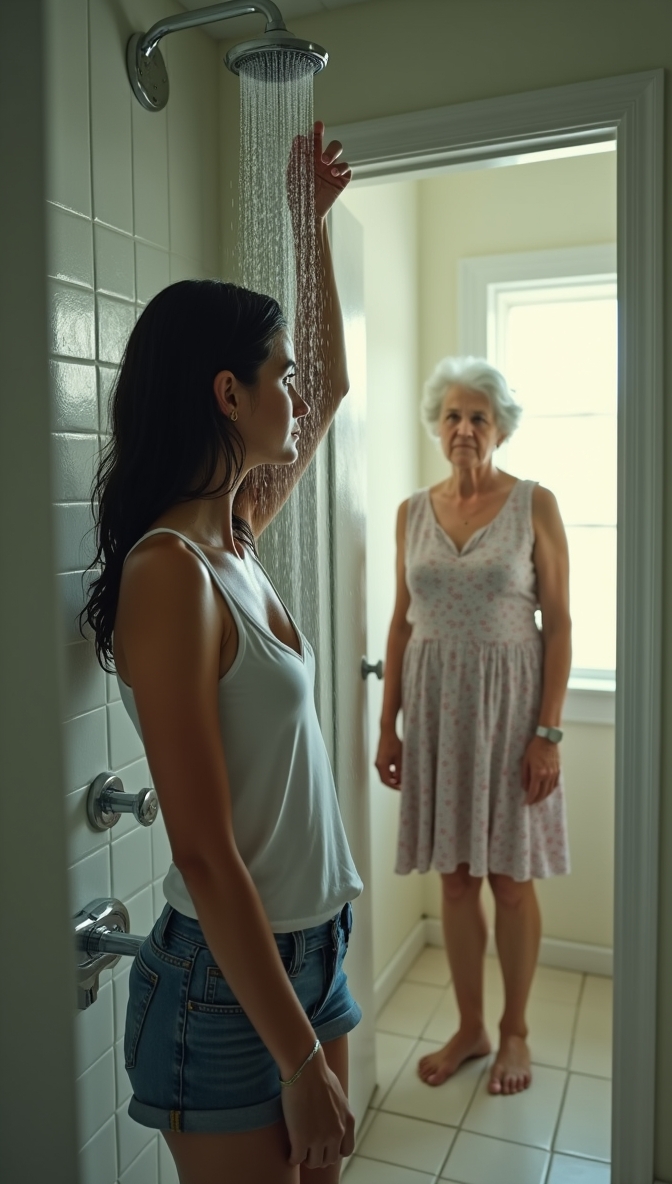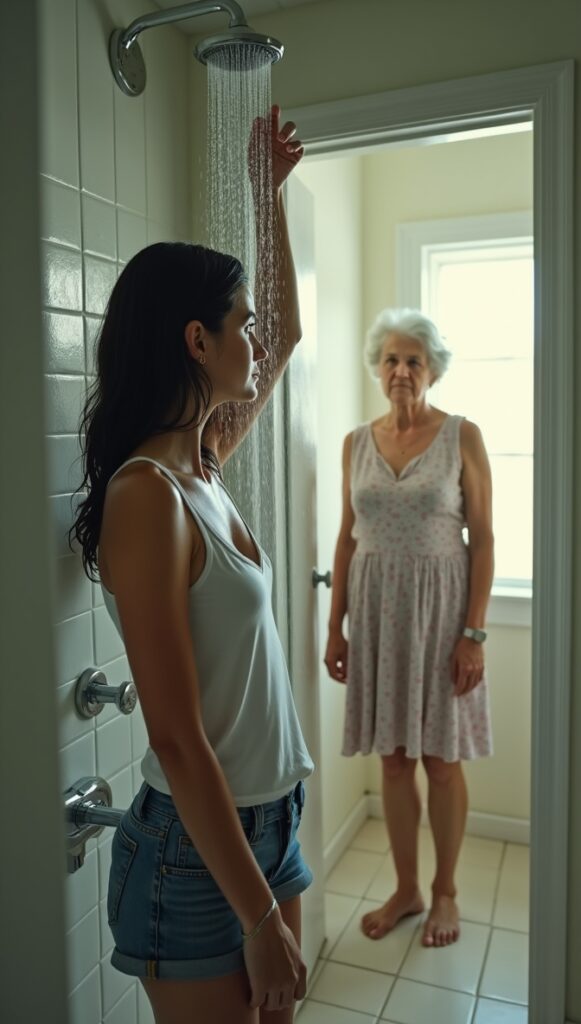When my son married Clara, I was relieved. She was gentle, polite, and seemed to adore him — something I hadn’t seen in any of his previous girlfriends. After years of watching him drown in work and loneliness, I thought he had finally found peace.
But peace, as I learned, can be the most deceptive thing in the world. It started three months after their wedding. Every evening, right after dinner, Clara would rise from the table, smile softly, and disappear into the bathroom. Always at the same time — 8:15 p.m., like clockwork.
At first, I assumed it was simple — self-care, perhaps. A long shower after a day’s work. But the sound of the water never matched the time she spent inside. Sometimes it ran for a few minutes, then stopped. Silence. Then it started again.
An hour. Sometimes two. And when she emerged, her hair was wet — but the air wasn’t steamy. No condensation, no trace of soap or lotion.
Just that smell. A heavy, cologne-like scent — not hers. Masculine.
I tried to push the thought away. My son, Adrian, was away at a construction site most of the week. Clara was a young woman, newly married, left alone in a quiet house with an old mother-in-law for company. It was normal to crave privacy.
But something about her pattern felt too exact. Too careful. Too secretive.

The First Red Flag
One morning, while tidying up, I found something strange under the sink — a small tin box wrapped in a towel. Inside were razors, gloves, and a small vial labeled only with two letters: “M.H.” It wasn’t any medication I recognized. When I asked Clara about it later that day, she smiled too quickly.
“Oh — that’s just something for my skin,” she said. “A treatment my dermatologist prescribed.”
But her tone was off. And her eyes didn’t meet mine. Later that night, I smelled that same cologne again — but this time, it wasn’t faint. It filled the hallway.
I remember thinking, what kind of skincare smells like a man’s cologne? I couldn’t take it anymore.
One Thursday night, after she went in for her usual “shower,” I crept toward the bathroom. I pressed my ear gently against the wooden door.
At first, I heard only running water. Then — it stopped.
Silence.
Then, a low voice. A man’s voice.
“You have to be careful. He can’t know.”
Clara’s voice followed, soft and trembling:
“I know. I just… I can’t keep doing this. It’s killing me.”
My blood turned to ice. I stumbled backward, pressing a hand to my mouth to keep from gasping. My heart hammered in my chest.
There was someone inside that bathroom with her.
I ran to my room, grabbed my phone, and called 911. My voice shook so hard I could barely speak. “There’s an intruder in my house,” I whispered. “He’s in the bathroom with my daughter-in-law.”
When the police arrived minutes later, the house was silent except for the sound of water running again.
“Stay here, ma’am,” one officer said, drawing his weapon.
They approached the door, knocked once.
“Police! Open up!”
Nothing.
They tried again. “Open the door, ma’am!”
Still silence. Finally, they kicked it open. Steam poured out — actual steam this time — and Clara screamed. She was alone.
The officers searched the small room thoroughly, opening every cabinet, every corner, even the laundry hamper. Nothing. No one. When they turned off the water, I saw her trembling in a towel, mascara streaked down her face, eyes wide with terror.
“What’s going on?” she cried. “Why are they here?”
“You tell me!” I shouted. “Who were you talking to?”
Her lips parted, but no sound came out. One of the officers gently asked, “Ma’am, were you expecting anyone in the house tonight?” She shook her head violently. “No. I swear. I was just—” Then she stopped mid-sentence. Her eyes flicked toward me — and I saw something pass through them. Not fear. Not guilt.
Regret. After the police left, Clara locked herself in her room. I didn’t sleep that night.
The next morning, she was gone. Her clothes, her toothbrush, even her wedding ring — all gone. Adrian returned home two days later, exhausted and confused. When I told him everything, his face drained of color.
“You called the police?” he asked softly.
“She was hiding something,” I said. “I heard a man’s voice!”
He sank into a chair, pressing a hand to his forehead. “Mom… there’s something I never told you.” He took a deep breath. “Before we got married, Clara’s brother — Mason — disappeared. He was in trouble, mixed up with bad people. She’s been trying to find him ever since.”
I frowned. “What does that have to do with—”
“She found him,” he whispered. “But he’s not the same. He’s… dangerous. She said she’d take care of him, but I thought she meant helping him get therapy, not…”
He trailed off, eyes distant. “Not hiding him.”
The Hidden Room
Three days later, while cleaning the attic, I noticed something odd — the wooden floor beneath the old water heater was newly cut and patched. Curiosity turned to dread as I pried at the edges. Beneath it, a narrow crawl space led down toward the pipes that connected… directly beneath the bathroom.
My pulse quickened. I grabbed a flashlight and crouched down. There, beneath the bathroom floor, lay a sleeping bag. A flashlight. A pile of food wrappers. And a man’s jacket. On the collar, stitched in small faded letters, were the initials: M.H.
My blood ran cold. I backed away slowly, the beam of my flashlight trembling.
He had been living under my house.
When Adrian saw it, he went silent. Then he whispered, “She didn’t leave.”
“What do you mean?”
“She must have gone to him.”
We called the police again. They searched the property, but Clara and Mason were nowhere to be found. Only that jacket, a few half-eaten protein bars, and a disposable phone with one text message draft unsent:
“If Mom finds out, she’ll call the police. We can’t stay here anymore.”
Mom.
Me.
Two weeks later, I got a call from an unknown number.
“Mrs. Carver?” a woman’s voice asked. “This is Detective Hughes from the county sheriff’s office. We located a vehicle registered to your daughter-in-law.”
My heart stopped. “Is she—?”
“It was found abandoned near the river. Two sets of footprints leading into the woods. We’re still searching.”
That night, I couldn’t sleep. Every creak of the house felt alive. Every shadow seemed to breathe. At 1 a.m., I heard a sound. A faint tap on the bathroom window. When I looked, there was nothing — just condensation forming against the glass. But written in the fog, in large shaky letters, were two words: “I’M SORRY.”
Months passed. Adrian moved out, unable to bear the memories in that house. I stayed — partly out of stubbornness, partly because I couldn’t let go. Then one day, while sorting through an old box of Clara’s belongings, I found a small cassette tape labeled in her handwriting: For When You’re Ready. I didn’t want to listen. BUT
To this day, she’s never spoken of it. And I’ve never asked.
But sometimes, when the house grows quiet at night, I think of that final line — and wonder whether Daniela’s nightly ritual had truly ended… or if she’s still keeping another secret, one even darker, for the sake of the man she loves.


